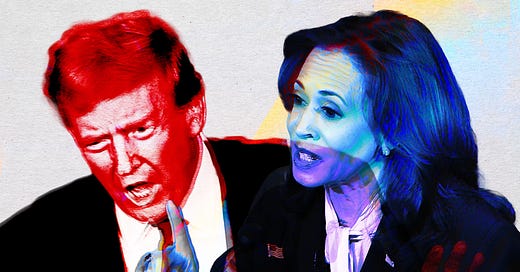
The Deepest Difference Between Trump and Harris
One question in the debate revealed the candidates’ diverging visions of America and its role in the world.
IN THE WIZARD OF OZ, the stentorian power of the great Oz is revealed to be a sham when Toto the dog (how apt) pulls back the curtain to unveil a squat, middle-aged man speaking into a microphone. Oz’s power was all artifice.
There were many such moments in the Harris/Trump debate. Kamala Harris pulled the curtain to reveal a shallow, insecure, addled bully so easily baited that he lapsed into raging and sputtering rather than prosecuting a case against his opponent.
One exchange in particular exposed a fiction at the heart of Donald Trump’s appeal: his supposed strength on the world stage. Moderator David Muir asked the former president if he wanted Ukraine to win its war against Russia. Trump refused to say yes. Instead, he offered this:
I want the war to stop. I want to save lives that are being uselessly—people being killed by the millions. It’s the millions. It’s so much worse than the numbers that you’re getting, which are fake numbers. Look, we’re in for $250 billion or more because they don’t ask Europe, which is a much bigger beneficiary to getting this thing done than we are. They’re in for $150 billion less because Biden and you [Harris] don’t have the courage to ask Europe like I did with NATO.
Recall that when Russia rolled its tanks into a peaceful neighbor—murdering, raping, and pillaging—Trump’s initial reaction was that Putin’s action was “genius.” He went on to praise Putin’s lying propaganda (that he was defending Ukraine’s “independence”) as “wonderful,” telling a podcaster that “He used the word ‘independent’ and ‘we’re gonna go out and we’re gonna go in and we’re gonna help keep peace.’ You gotta say that’s pretty savvy.”
It’s clear that in the two and a half years since, Trump’s moral compass has not righted itself. It was a simple question for a would-be president: Does he want our democratic ally, which has been brutalized, to win its war of self-defense? He could not say yes, and what’s more, he instantly turned to where his heart truly lies—with money. Even if it were true that the United States had paid the lion’s share of Ukraine’s defense, that would be a point of pride. But it isn’t true—Europe has contributed much more when financial and humanitarian contributions are included. Trump misstated the relative contributions of NATO members to Ukraine’s defense. As a percentage of GDP, the United States’s contributions rank behind sixteen other countries.
More ominously, Trump showed again that he has a cash register where his soul should be.
Harris, by contrast, invoked the importance of sovereignty and territorial integrity. She also used a word that is not in Trump’s vocabulary. She said the actions of NATO, “the greatest military alliance the world has ever known,” were “righteous.”
I met with President Zelensky. I shared with him American intelligence about how he could defend himself. Days later I went to NATO’s eastern flank, to Poland and Romania. And through the work that I and others did we brought fifty countries together to support Ukraine in its righteous defense. And because of our support, because of the air defense, the ammunition, the artillery, the Javelins, the Abrams tanks that we have provided, Ukraine stands as an independent and free country.
This is the language of human rights, dignity, honor, loyalty—all alien concepts to Trump.
What followed also provided a glimpse into Trump’s essential smallness. After Harris’s bold declaration of solidarity with Ukraine and NATO and her contempt for Trump’s truckling to dictators, Trump responded with timid bleats about Putin’s nuclear arsenal.
But eventually, you know, he’s got a thing that other people don’t have. He’s got nuclear weapons. They don’t ever talk about that. He’s got nuclear weapons. Nobody ever thinks about that. And eventually maybe he’ll use them. Maybe he hasn’t been that threatening. But he does have that. Something we don’t even like to talk about. Nobody likes to talk about it.
You know who does talk about that all the time? Putin. He has threatened to use his nuclear arsenal on countless occasions. When he invaded Ukraine in 2022, he warned that “Whoever tries to hinder us, or threaten our country or our people, should know that Russia’s response will be immediate and will lead you to consequences that you have never faced in your history.” Later that year, he thundered that “If the territorial integrity of our country is threatened, we will without doubt use all available means to protect Russia and our people—this is not a bluff.” He referenced the bombing of Hiroshima and Nagasaki, saying that the United States had established a “precedent.”
Cooler heads than Trump’s see Putin’s threats for what they are: bluster. Obviously one cannot dismiss his arsenal out of hand, but neither should the world cower in the face of one empty threat after another. Ukraine is at this moment holding territory it seized from Russia and flying drones into Moscow and beyond. Putin found Volodymyr Zelensky impossible to intimidate—not so Donald Trump.
















